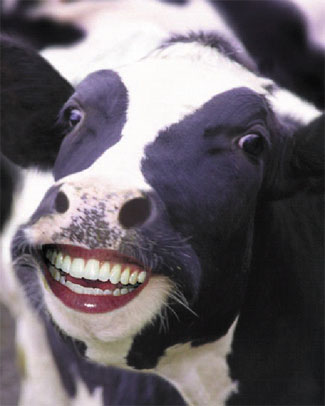 Are humans safer when they’re happy? Are you?
Are humans safer when they’re happy? Are you?
Ok. Now follow this logic…
Are cows?
I’m willing to go along with the California Cow commercial that claims “Great cheese comes from happy cows” and maybe even the only happy cows in the world come from California. Why not – the weather is nice and the people are laid-back. But does that necessarily mean their milk is safer?
In a post today on http://wewantorganicfood.com/
author, Lynn Cameron says, “If there could be a master key to safe raw milk, I think it would be contented cows.” The author contends that today, some raw milk is unsafe because some cows spend their days indoors, “living on field corn and soybeans to the degradation of their milk and the degeneration of the nation’s health.” I guess this is something akin to the cubicle complex.
Call me a skeptic, but I really need some science to back up this happy feeling. It’s nice to think that happy cows frolicking on the hill cannot produce anything bad. The author of the article rightfully makes a call to our nostalgia – to a happier time before farming was industrialized. Nostalgia is nice, but it does not make food safer. While Cameron says, “It’s not complicated science to understand that quality of life as well as diet affects cows’ milk quality,” her inability to produce that uncomplicated science leaves me completely unconvinced. This kind of thinking, that cows “raised entirely outdoors on green grass and/or hay, their milk is proven time and again greatly reduced in pathogens (bad bacteria),” has really not been proven as explained by David Renter in September 2006. “Cattle raised on diets of ‘grass, hay and other fibrous forage’ do contain E. coli O157:H7 bacteria in their feces as do other animals including deer, sheep, goats, bison, opossum, raccoons, birds, and many others.”
I’m completely in favor of good conditions and happy cows – who wouldn’t be? But even in the best conditions, microbiological contamination can happen – just as it happens in very happy homes with very content cooks. “Confinement cows” or “happy cows,” the only scientifically proven measure to reduce the risk of dangerous pathogens in milk is pasteurization.
